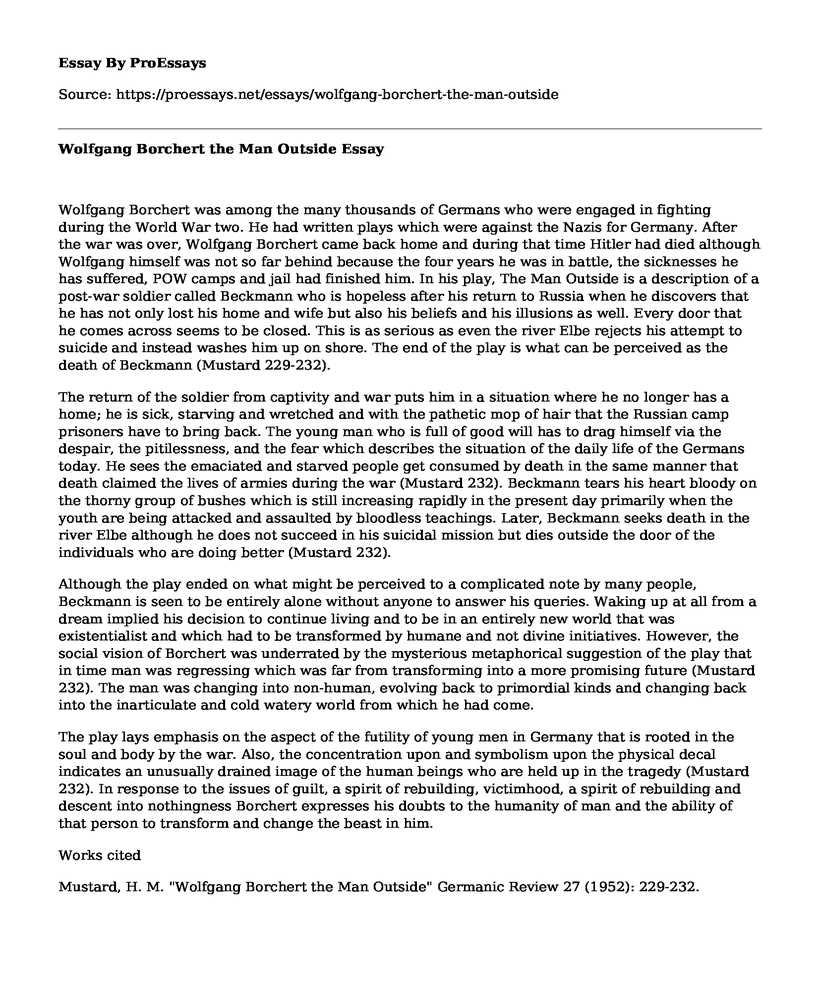Wolfgang Borchert was among the many thousands of Germans who were engaged in fighting during the World War two. He had written plays which were against the Nazis for Germany. After the war was over, Wolfgang Borchert came back home and during that time Hitler had died although Wolfgang himself was not so far behind because the four years he was in battle, the sicknesses he has suffered, POW camps and jail had finished him. In his play, The Man Outside is a description of a post-war soldier called Beckmann who is hopeless after his return to Russia when he discovers that he has not only lost his home and wife but also his beliefs and his illusions as well. Every door that he comes across seems to be closed. This is as serious as even the river Elbe rejects his attempt to suicide and instead washes him up on shore. The end of the play is what can be perceived as the death of Beckmann (Mustard 229-232).
The return of the soldier from captivity and war puts him in a situation where he no longer has a home; he is sick, starving and wretched and with the pathetic mop of hair that the Russian camp prisoners have to bring back. The young man who is full of good will has to drag himself via the despair, the pitilessness, and the fear which describes the situation of the daily life of the Germans today. He sees the emaciated and starved people get consumed by death in the same manner that death claimed the lives of armies during the war (Mustard 232). Beckmann tears his heart bloody on the thorny group of bushes which is still increasing rapidly in the present day primarily when the youth are being attacked and assaulted by bloodless teachings. Later, Beckmann seeks death in the river Elbe although he does not succeed in his suicidal mission but dies outside the door of the individuals who are doing better (Mustard 232).
Although the play ended on what might be perceived to a complicated note by many people, Beckmann is seen to be entirely alone without anyone to answer his queries. Waking up at all from a dream implied his decision to continue living and to be in an entirely new world that was existentialist and which had to be transformed by humane and not divine initiatives. However, the social vision of Borchert was underrated by the mysterious metaphorical suggestion of the play that in time man was regressing which was far from transforming into a more promising future (Mustard 232). The man was changing into non-human, evolving back to primordial kinds and changing back into the inarticulate and cold watery world from which he had come.
The play lays emphasis on the aspect of the futility of young men in Germany that is rooted in the soul and body by the war. Also, the concentration upon and symbolism upon the physical decal indicates an unusually drained image of the human beings who are held up in the tragedy (Mustard 232). In response to the issues of guilt, a spirit of rebuilding, victimhood, a spirit of rebuilding and descent into nothingness Borchert expresses his doubts to the humanity of man and the ability of that person to transform and change the beast in him.
Works cited
Mustard, H. M. "Wolfgang Borchert the Man Outside" Germanic Review 27 (1952): 229-232.
Cite this page
Wolfgang Borchert the Man Outside. (2021, Mar 14). Retrieved from https://proessays.net/essays/wolfgang-borchert-the-man-outside
If you are the original author of this essay and no longer wish to have it published on the ProEssays website, please click below to request its removal:
- Analysis of Beauty by Jane Martin
- Are Celebrities Entitled to a Private Life?
- Art and Architecture Essay: Jack Whitten
- What Can We Learn From Dialectical Diversity of the English Language in the United States?
- Essay on Love and War Unite in Leonato's Home: Claudio and Hero's Romance
- Essay Sample on Defining Family & Family Structure: Exploring Different Perspectives
- Essay Example on George Carlin: Exposing the 'Truths' Concealed by Euphemisms







